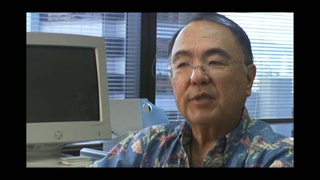Interviews
His experiences in Chicago after WWII
I don’t recall any real discrimination. So, Chicago was pretty good in that sense. And at school, I didn’t sense anything. There were a fair number of Japanese in the school. I’m not exactly sure why, but when the Japanese went to Chicago, they tended to cluster to just maybe for some kind of a feeling of ease that they went together. So, at this high school, there were a fair number of Japanese also.
Date: February 10, 2004
Location: California, US
Interviewer: Gwenn M. Jensen
Contributed by: Watase Media Arts Center, Japanese American National Museum.
Explore More Videos


World War II hysteria against Japanese in New York City
(1924-2018) Researcher, Activist

His testimony has more credibility because of his race
(1922 - 2005) Former U.S. Army counterintelligence officer

Different tension between East Coast and Los Angeles
Japanese American Creative designer living in Japan

Being an American soldier and an "enemy alien"
(1923-2011) Lawyer, MIS veteran, founder of Francis and Sarah Sogi Foundation

Not relating to Japan Americans' experiences on the mainland
(1923-2011) Lawyer, MIS veteran, founder of Francis and Sarah Sogi Foundation

Being stationed in Japan during the American occupation
(1923-2011) Lawyer, MIS veteran, founder of Francis and Sarah Sogi Foundation

Rebuilding Japan
(1923-2011) Lawyer, MIS veteran, founder of Francis and Sarah Sogi Foundation


Less information about Hawai‘i in mainland
(b.1944) Founder of Kobayashi Group, LLC

A teenager's memories of how a local newspaper misrepresented Japanese Americans
(b. 1925) Draft resister

The role of the media in influencing people's opinions
(b. 1925) Draft resister

Living conditions in prison while serving time for resisting the draft
(b. 1925) Draft resister

Talking to children about decision to resist the draft during World War II
(b. 1925) Draft resister

Reflecting on Japanese Americans' response to incarceration
(b. 1925) Draft resister
